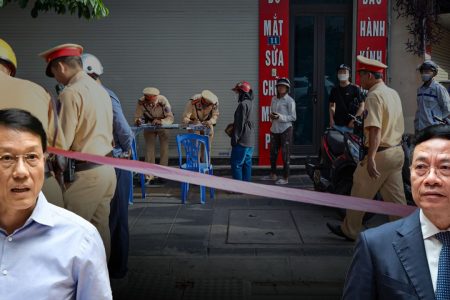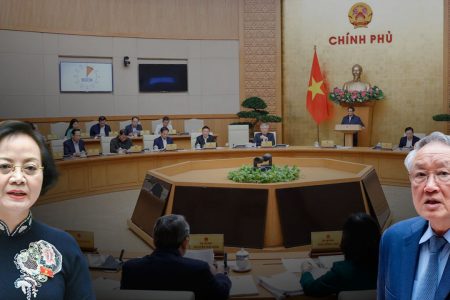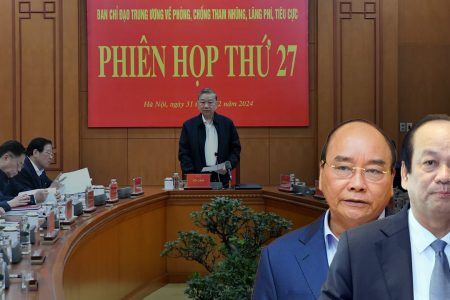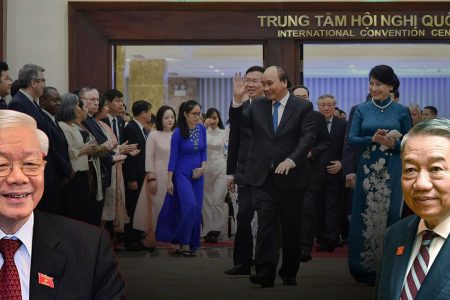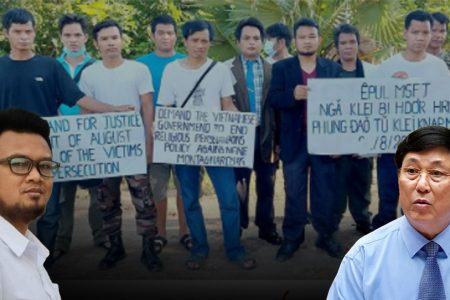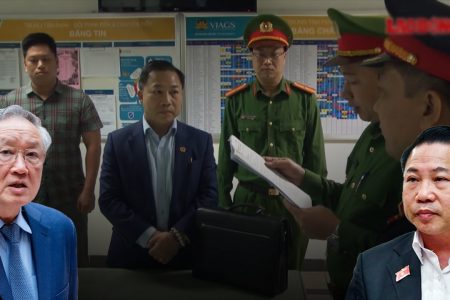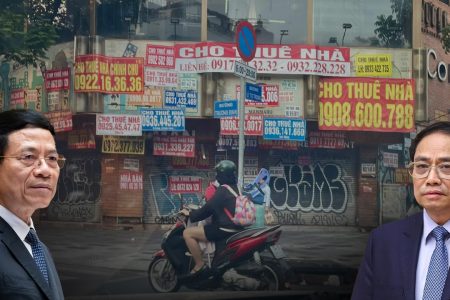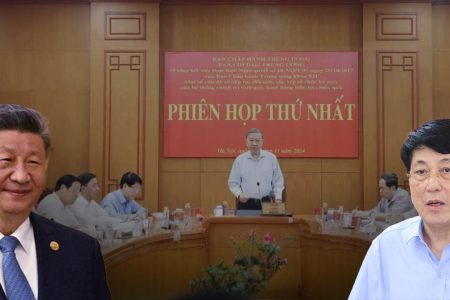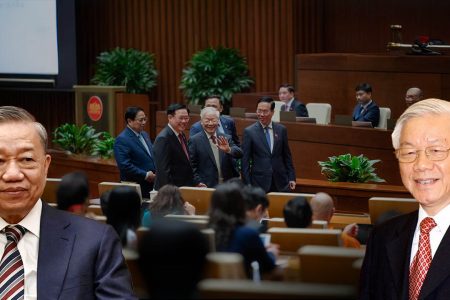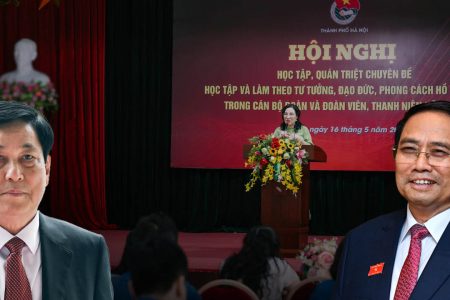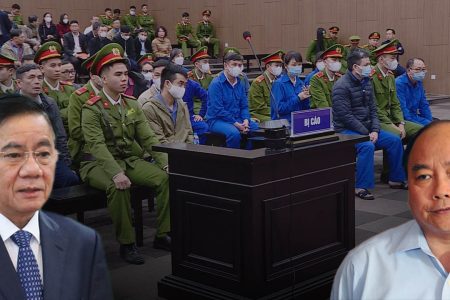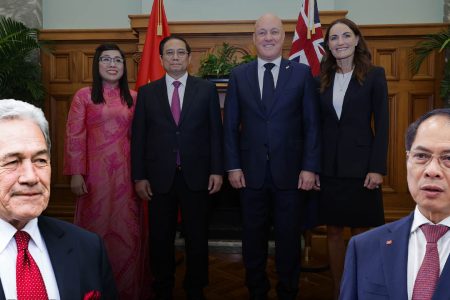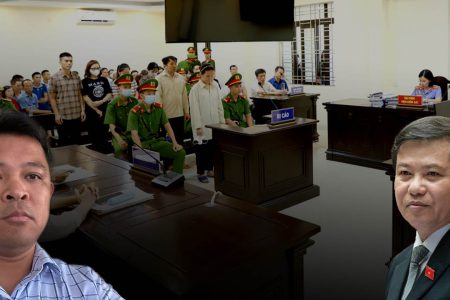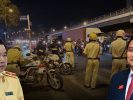
Lawyer Dang Dinh Manh has just registered to defend Ms. Pham Doan Trang at the Security Investigation Agency of the Hanoi Police Department with a petition about the jurisdiction of the case.
According to the Ministry of Public Security, Hanoi’s Security Investigation Agency probed Ms. Trang on charges of “conducting propaganda against the State of the Socialist Republic of Vietnam” under Article 88 of the 1999 Penal Code and “making, storing, distributing or disseminating information, documents and articles to oppose the State of the Socialist Republic of Vietnam” under Article 117 of the 2015 Criminal Code.
According to Pham Doan Trang’s defense lawyer, this is a crime of a group of national security violations, often with very heavy sanctions, the highest penalty can be up to 20 years in prison with the additional penalty of probation for 1-5 years after serving the main penalty.
Answering BBC News in Vietnamese on October 12, lawyer Dang Dinh Manh said:
“Usually, as a rule, within 24 hours, lawyers will be issued a defense certificate. But cases like Trang’s belong to the national security iprovisions, the agency conducting the proceedings has can be based on keeping work secret, only to allow the lawyer to participate in the case, to contact with the client and to access the file at the end of the investigation phase of the case.”
On the morning of October 12, Pham Doan Trang’s Facebook, believed to be managed by an authorized person, announced that the family had sent gifts (personal belongings, clothes and money) to Temporary Detention Center No. 1 under authority of the Hanoi Police Department for Ms. Trang but has yet to meet her.
What does Ms. Pham Doan Trang sign in the picture?
A few days after Ms. Pham Doan Trang’s arrest, on some information pages appeared a picture of her working at the investigation agency. Some people surmise that this is a picture proving that Ms. Trang has signed a plea. Another stream of opinions said that the publication of the image of Ms. Trang in handcuffs was a deterrent to dissidents.
Regarding the pictures circulated on the Internet, Mr. Manh said that these might just be pictures of Ms. Trang signing the record of sealing/or opening the seal of items seized during the arrest.
For further explanation, lawyer Dang Dinh Manh said:
“At this time, we do not know much about the content of the photo of Ms. Doan Trang. In case she has confessed to the crime at the investigation agency, we believe that the confession clip will soon appear on the official TV station. But up to now a week after the arrest, information of that kind has not appeared, perhaps Doan Trang did not think that she has committed a crime to confess guilt.”

In the letter she left before her arrest, Trang said that she would not plead guilty but only admit her behavior, in particular the writing of books and her wish to abolish the dictatorship in Vietnam.
Mr. Manh analyzed with BBC:
“Regarding admitting acts, not pleading guilty in the left letter, Trang does not think such acts are illegal. To some extent, she thinks that she is exercising her right to freedom of expression according to the constitution. Therefore, the letter Trang left did not cause any problems or difficulties for the lawyer.”
The lawyer explained: “It is necessary to distinguish between admitting guilt and admitting the act. Along with admitting the act, many people claim to have pleaded guilty. In Trang’s case, she admitted she was the author of books like Nonviolent Resistance, Popular Politics for Common People, or more recently the Dong Tam Report, but she sees those are the rights that citizens can exercise according to the constitution. The Security Investigation Agency is violating the law.”
In addition, Mr. Manh also emphasized the importance of confessing crimes in cases related to crimes of infringing upon national security.
“In the case of the public’s public interest, the confession of those arrested, especially in the early days of arrest, is extremely important and meaningful. Helping the investigating agency prove that the arrest and probing of the case are completely correct. Even the defendant himself had to confess and surrender through admitting the crime,” Mr. Manh wrote on his personal Facebook.

Mr. Vu Quoc Ngu, director of Defend the Defenders, told BBC News Vietnamese on January 15 that the Vietnamese government may have learned from China the form of coersive confession on television, and recently used this technique more and more.
With this scenario, in the Dong Tam case, on January 13, three people in Hoanh village pleaded guilty to the incident after the police brought troops into Hoanh village on January 9.
In 2018, Will Nguyen – a Vietnamese-American activist – also ‘confessed on television’ after being arrested during a protest against two bills on the Special Economic Zones Law and the Cyber Security Law.
In 2017, Mr. Trinh Xuan Thanh suddenly appeared on television, related to corruption in the oil and gas industry, after it was reported that he was hiding in Germany. Dissidents such as lawyer Le Van Dai and lawyer Le Cong Dinh previously pleaded guilty on television.
Risk of two judgments for the same behavior?
Hanoi City’s Security and Investigation Agency prosecutes charges of “conducting propaganda against the State of the Socialist Republic of Vietnam” under Article 88 of the 1999 Penal Code and charges of “making, possessing, distributing or declaring transmit information, documents and articles to fight against the State of the Socialist Republic of Vietnam “according to Article 117 of the 2015 Criminal Code.
Before these two crimes, many people are concerned because the nature of the crime is same but Ms. Trang can face the risk of receiving a sentence from both crimes.
Regarding this, lawyer Dang Dinh Manh told BBC News Vietnamese:
“Article 88 of the 1999 Penal Code and Article 117 of the 2015 Criminal Code are two provisions of two previous and later legal documents. But in fact, the content of both is just a crime. Although different in name and some things, it is still one. The 2015 Criminal Code’s Article 117 has a heavier punishment.”
“Theoretically, the two crimes will be added up. Reality will not be clear because this offense is ambiguous, only qualitative but not quantitative. Trang’s behavior lasted from before this date until now. Then, on January 1, 2018, the new law will take effect, Accordingly, acts before January 1, 2018, must apply the old law. Also, acts after January 1, 2018, must apply a new law. If the new law and the old law the penalty do not change, then the new law will apply. But the new law has a higher penalty than the old law, then the principle in favor of the defendant will be applied,” Mr. Manh explained.
In June, the family of activist Trinh Ba Phuong including him and his younger brother Trinh Ba Tu and his mother Can Thi Theu were also arrested and detained for investigation under Article 117 of the 2015 Criminal Code.
Mr. Manh added that lawyers who defend national security crimes often do not agree to this law.

“The scope of the exercise of the right to freedom of expression with the violation of Article 88 of the 1999 Penal Code and Article 117 of the Criminal Code 2015 is very vague. The investigating agency pointed out where the boundary is, it can be said that it is a complete assessment. This blurred line also makes it difficult to defend.”
“Although we disagree and we still have recommendations to amend or cancel it, but in case the law is still in force, to a certain extent, this law goes against freedom The law of the Constitution The argument of the lawyers, in this case, is that the behavior of people like Ms. Trang is not violating the law based on the Constitution. The legal effect of the Constitution is higher than the Penal Code. If the version has a lower legal effect, the priority must be given to the Constitution,” Mr. Manh reasoned.
Also a defense lawyer in the Dong Tam case, lawyer Manh shared:
“The Dong Tam trial has a lot of procedural issues, our lawyers have not approved. However, for each case we receive, we still have to do our best according to the standards set by the law. Based on how I evaluate, I set out requirements and recommendations so that it both conforms to the provisions of the law and protects my clients.”
“It is not because of some cases that I am not satisfied, then I give up or compromise with the wrong things. We do not have such a view in the defense, nor is the case of Ms. Trang,” Mr. Manh speak.
Thoibao.de (Translated)



